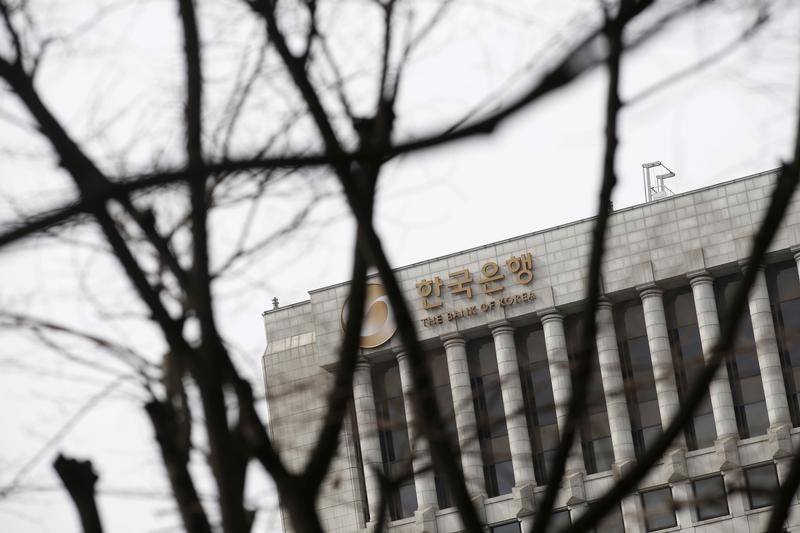By Cynthia Kim and Dahee Kim
SEOUL (Reuters) - South Korea's central bank is expected to raise interest rates for the first time in over six years at its Nov. 30 meeting, months earlier than previously anticipated, after the economy grew at a robust pace in the third quarter, a Reuters poll showed.
A rate increase would mark the Bank of Korea's (BOK) first tightening since June 2011, and bring an end to a five-year easing cycle which began in July 2012.
Asia's fourth-largest economy has been riding an unexpectedly robust export cycle on strong global demand for memory chips, which has been cushioning some softness in private consumption.
Eleven of 13 economists polled by Reuters said they now see the BOK raising its policy rate
That was marked switch from an Oct. 17 poll, where economists were unanimous in expecting the bank to stay on hold for the rest of this year. Only a small minority had predicted a hike in the first half of 2018.
All of those who forecast a hike in November cited much stronger-than-expected third-quarter growth readings posted on Oct. 26. The data showed the economy clocked its fastest growth in seven years on soaring global demand for the country's electronics, particularly memory chips.
"It looks like a November hike is almost a done deal," said Stephen Lee, a fixed income analyst at Meritz Securities who changed his Nov. 30 view to a hike from a hold.
"I sensed the BOK may be gearing up for a hike after the bank's October meeting but third-quarter growth nicely beat even the BOK's own forecast," Lee said, adding that conditions "now look right" for a tightening.
The BOK kept its policy rate unchanged on Oct. 19 but one dissenting policymaker called for a hike, prompting some speculation that a tightening could be on its way.
The BOK had cut rates eight times over the past five years to re-energize Asia's fourth-largest economy, even at the risk of aggravating high levels of household debt.
The move will be following the rate-hike path of the U.S. Federal Reserve, which is widely expected to raise rates for a third time this year in December and continue to whittle down its massive balance sheet.
But South Korea's domestic demand has remained sluggish, leaving growth still heavily reliant on exports.
Private consumption grew 0.7 percent in the third quarter from three months earlier, only at half the rate of overall GDP in the third quarter. Output from the construction sector expanded 7.5 percent from a year earlier, the slowest pace in nine quarters.
Policymakers are also keeping a watchful eye on debt-laden domestic households struggling with limited income growth and the threat that poses to consumption.
Some analysts say domestic demand may not be strong enough to warrant a rate hike and that BOK should hold its fire this year.
"We really need to see how South Korea's economy goes in the fourth quarter. Pre-holiday effects might have made the (Q3) figures come out much bigger than they really are, which means it will be better for the BOK to wait a bit, further monitoring economic data," said Lee Jae-hyung, an economist at Yuanta Securities, who believes the BOK will hold fire until the end of this year.
Lee sees the BOK starting to raise rates in the first quarter of next year.
South Korea celebrated the annual thanksgiving holiday from Oct 2. through Oct. 9. Businesses may have "front loaded" shipments into September, which could skew October readings.
October trade data, due on Nov. 1, is expected show another month of strong exports, after September marked a ninth consecutive month of double-digit expansion.
"There are fewer working days in October (then September) but exports will continue to show strong performance driven by sales of semiconductors," said Kathleen Oh, an economist at Standard Chartered (LON:STAN) Bank of Korea.
